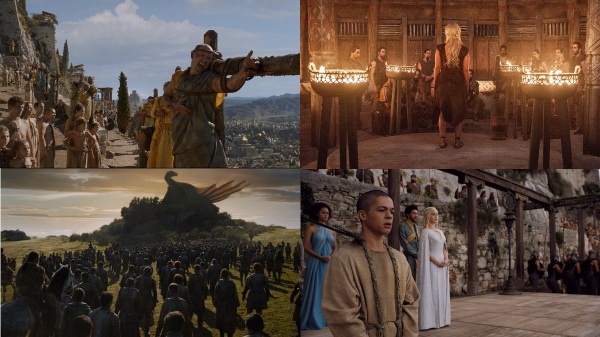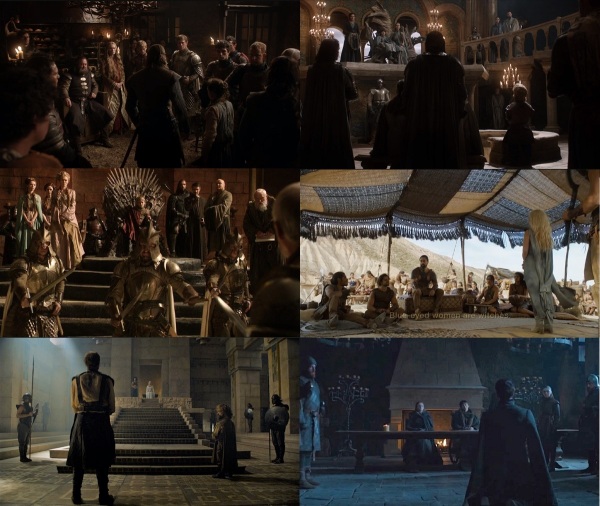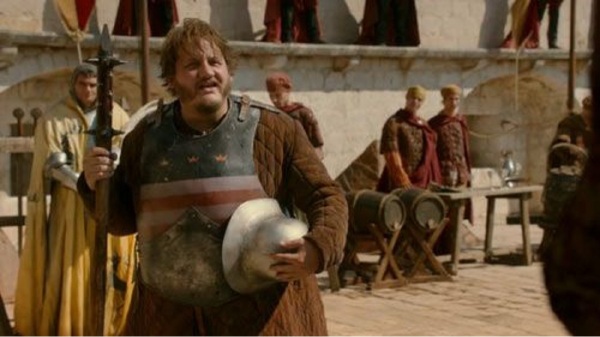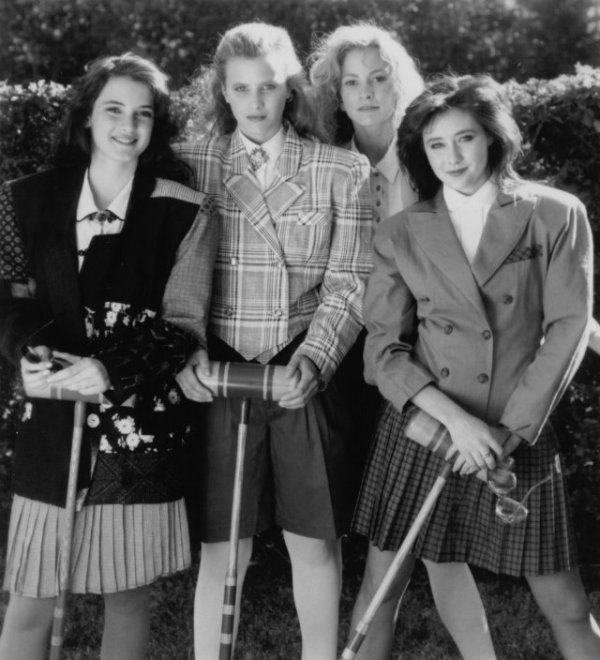SPOILERS SPOILERS SPOILERS up to Game of Thrones Episode 2 of Season 8 – Since the books haven’t gotten that far, this focuses on where writers Benioff and Weiss have taken the world of Ice and Fire.
Lo, many years ago, I took a (fanboy-glazed) gander at The Game of Thrones / Song of Ice and Fire at roughly the halfway point through its arc, and particularly at the interesting things the series does with the concept of justice. The im/possibility of justice in this feudal-ish world remains among the dominant themes, if not the dominant theme, and the series has continued to tease out some important questions worth thinking about. Rereading my earlier piece, I’m struck that I still basically agree with its conclusion, that in Westeros atomistic, small-scale justice may be the best its inhabitants can hope for, and that might, in fact, be enough to preserve their humanity.
What the show gets right about feudal justice is that judicial power flows from the authority of the lord (or occasionally lady). State structures are fairly weak, and the only checks on the power of lords are the lords above them in the hierarchy, the Church, and the weight of family and tradition. But the show only shows us the top echelons of the feudal system of justice. Where are the magistrates, market inspectors, sheriffs, and tax collectors solving petty disputes, punishing theft, and keeping the wheels of commerce turning? It’s never implied that such positions don’t exist in Westeros, but they seem to have no impact on the story or characters, leaving the impression that the bottom-most level of the pyramid of power consists of the lord’s banners, and that justice only extends to the matters brought before the lord in question. The advisors and vassals in the immediate orbit of the lord may hope to influence that justice, but those in the great voids between lordly courts are left to carve out their own little pockets of personal justice if they can. It’s a feudalism with barely any institutions to make it a “system.” An individual lord’s sense of justice thus has an outsize influence on the course of events – awful for the real world, but narrative gold if you want to tease out dramatic consequences of character choices.
A common criticism of the HBO series once the story passed the point of George R. R. Martin’s books is that it has become less an inversion of high-fantasy Tolkienism and more a reinforcement of it. Undoubtedly, this has been driven by the need to keep things reasonably popular with the fanbase – don’t you dare kill off Brienne! But I don’t think Benioff and Weiss have given up on turning the tables on fantasy conventions. Fans have complained about some of the characters’ decisions over the last few seasons. They don’t seem quite in character, they say, or they seem stupid. In some cases, this may indeed be flawed writing – the dialogue is certainly less crackling than when they had Martin’s great source material to draw from. But I think it’s in those moments where something feels a little off, where our sensibilities rebel, that we’re still seeing the work of inversion and critique play out.

Wielding the sword yourself may be noble from one perspective. But from another, it is the aggregation of all judicial power in a single person and an unwillingness to build institutions of justice that can exist in the lord’s absence.
THE TROUBLE WITH PARAGONS
The heroes in typical high fantasy don’t start out at the top, or if they do, they are soon cast down by a villain or circumstance so that they can rise again from the bottom. If they didn’t already know, they will learn early in their arc that they are destined to be the king/queen/savior of the land or others will thrust that destiny upon them in recognition of the hero’s apparent qualities – nobility, strength, leadership, ability to withstand flames, etc. Jon and Daenerys both follow very typical fantasy heroic arcs, so one shouldn’t really be shocked when Martin, Benioff, and Weiss try to turn the tables on the trope. Their hero-ness ends up complicating their attempts to bring justice into the world.
It’s hard not to see why Daenerys’ story has inspired fans of all genders. While it hits many of the beats of male hero-savior stories, it also never loses sight that she is a woman shaped by the particular prejudices and indignities heaped upon women in this world (and ours). The gender revolution she enacts in Khal Drogo’s bed empowers her to take up other missions of inversion – Could she, not Viserys, be the Dragon? Can slavery be stopped? Can social classes so long at odds with one another be encouraged to live in harmony? Her own experiences, her successes, and some of her failures lead her to believe that she is the Revolution embodied. It is her destiny to rule.
Importantly, her sense of destiny is earned. She uses her family name as a tool, but doesn’t rest on that, emphasizing in her official title her own accomplishments – the Unburnt, Breaker of Chains, Mother of Dragons. And while she is familiar with the Prophecy of Azor Ahai, the Prince that was promised, she doesn’t particularly embrace it as personal belief, even if Tyrion and Varys are able to make use of the Red Priestesses to bolster public order in Daenerys’ absence. This is an important difference between her and Stannis. Stannis’ sense of destiny was born of entitlement – he should be king because that’s what the rules say, he’s the most qualified, plus he’s being told he’s Azor Ahai. Any of these could apply to Daenerys, but these do not animate her sense of destiny the way her Revolution does, and the purpose of that Revolution is to bring justice to those to whom is has always been denied.
However, like Stannis, her sense of destiny is also her blind spot and the source of many of her missteps. The Revolution is too caught up in her own person, and she sees herself as the irreplaceable part of it. Her reluctance to discuss institutions of succession or even institutions of anything shows a certain arrogant assumption that she alone can save the world. We get a sense of her values – she doesn’t like slavery, rape, or gladiatorial combat, but she never articulates a larger vision of justice. Once you break the wheel, what replaces it? Daenerys. That’s all well and good in lands that she’s liberated herself (did she really leave behind a sustainable system in Essos, though?), but what happens when she goes to a foreign land with superior armies and dragons proclaiming regime change without having done the homework about the people she’s seeking to liberate? Did she really expect them to welcome her with open arms?
And like revolutionaries before her, she interprets disagreements with her as counter-revolutionary plots. Her Destiny, her Revolution should be self-evident to those with eyes to see. In such cases, she goes straight to the harshest punishments – crucifixion, beheading, and incineration. To her followers in Essos, she is exceptional, but to her intended subjects in Westeros, she has yet to convince them of her exceptionalism by word or deed. And time may be running out for a charm offensive.

Unlike the Stark boys, Daenerys like to branch out in her methods of execution: The Masters of Meereen crucified S4E3, the Khals of Vaes Dothrak are about to get a taste S6E4, Tarly Smores S7E5, and Mossador beheaded for robbing her of the opportunity to behead a Son of the Harpy S5E2.
Jon Snow is similarly blinded by his own idealism. He makes his decisions based on his notion of the Greater Good, the good of human beings surviving, namely. In this he is clearly right, but his justifications are so high in the stratosphere that he often forgets to articulate them clearly to his followers, which gets him into trouble. His confidence in his rightness also leads him to ignore the advice of his friends and family. Tyrion may complain of the difficulty of restraining Daenerys’ impulsiveness, but at least she has the courtesy to let her advisors say their piece. Jon has rarely changed his mind in response to counsel. Jon’s decisions to bring the Free Folk south of the wall and to pardon the children of the bannermen who sided with the Boltons at the Battle of the Bastards are noble and also strategically “correct” for a number of reasons. The Living need as many warriors as they can get, after all. But he fails to persuade his followers of this, resorting to “This is the right thing to do, and my decision is final.” That gets knives through his heart and grumbling bannermen.
One of the things the series calls into question is the high fantasy assumption that nobility is the barometer of justice and goodness. Acting nobly can be short-sighted, and to the extreme can be paradoxically selfish. Ned Stark’s adherence to his code of nobility is the cause of much of the chaos after the death of Robert. Nobility has good intentions – by going high, you may shame your enemies and inspire your allies to get to your goal. But it is predicated on viewing oneself and having others view you as morally superior. And there’s the rub. In a world where a shared sense of nobility shapes social norms, you might earn the esteem of others simply by following the code. But Westeros is not such a world.

Feudal court judgments in ideal form – testimony is given, advisors counsel, and sentences are rendered. Robert judges Arya, Nymeria, and Lady S1E2, Tyrion flirts with the Moon Door S1E6, Ser Barristan is ejected from the Kingsguard S1E8, Daenerys is judged by Khal Moro S6E1, Tyrion counsels exile for Jorah S5E8, and Littlefinger finds himself without a ladder S7E7.
OF CYNICS AND HUNGRY DOGS
Remember back in Season 1 when Sansa was just the most annoying character ever? This was certainly not on Sophie Turner – who has grown tremendously as an actor and brought Sansa’s dramatic evolution to life over the years. But the character was just so naïve, so self-absorbed, and in denial of the hollowness of the privilege she sought to partake in. She was the poster-child of high fantasy fandom, romanticizing the feudal, patriarchal system she was embedded in and a victim of. While the suffering she has undergone over the course of the series is not the source of her intelligence or her strength, the need to survive has forced her to recognize those resources and value and hone them rather than simply “being a lady.” Now in Season 8, she’s the only one that seems grounded in reality, worrying about where they will find food to feed a vast army and two dragons in Winter, and questioning the impulsive, poorly thought-out decisions of Jon and Tyrion. She is finally a master of the Game. If only they would listen.
Remember back in Season 1 when Tyrion was the cleverest man alive? By sheer wits alone, he managed to dull many of the brutalities of the others at court. Powered by the twin talents of drinking and knowing things, he was able to see the injustices of the world for what they are and was also able to see the ways he could tease the strings of power just enough to make a difference. But he’s made a series of disastrous choices as Daenerys’ Hand that call into question his wisdom, from allowing a temporary reprieve from the abolition of slavery during the uprising in Slavers’ Bay to trusting his sister to commit the Lannister army to the fight against the Dead. His problem is that he’s lost much of his cynicism, as he’s admitted. He’s become an idealist and has lost sight of the way this brutal, feudal world really works, and consequently how to shape it for the better. He’s looking for ways to redeem people rather than mitigating the actions of the irredeemable.
Sansa and Tyrion have traded places, in perfect counterpoint.
Moments of public justice drive much of the show’s action – court proclamations, death sentences, and “trials” are the scenarios in which most of the characters are forged and make fateful choices. But for the number of “trials” in the series, few of them are actual trials with actual witnesses and cross-examination. Usually, the accused has been pressured into confessing, or the verdict has been decided before any defense can be given. Tyrion’s trial for the murder of Joffrey comes closest to a true trial, complete with a small jury of leaders of differing opinions and limited opportunities to mount a defense. But the cards are still stacked against him. Right before the trial by combat begins, Tyrion has a conversation with Jaime that captures something at the core of Tyrion’s character and his take on this world’s justice.
The larger implications of the story of Orson Lannister are at least political and probably also theological.
I would eat my lunch in the garden, chewing my mutton to the music of “kun kun kun”. And when I wasn’t watching him, I was thinking about him. Father droned on about the family legacy and I thought about Orson’s beetles. I read the histories of Targaryen conquests. Did I hear dragon wings? No, I heard “kun kun kun”. And I still couldn’t figure out why he was doing it. And I had to know because it was horrible, that all these beetles would be dying for no reason.
At the end of the speech, he lets the beetle go (alright it’s technically a pill bug in this scene, not a beetle, you nitpickers!). A small act of kindness, a small withholding of cruelty towards a creature of no consequence. It’s perhaps the most transcendent moment in the entire series for me. There is death all around, Tyrion is himself likely about to be sentenced to die unjustly, it’s just a bug, yet it is still possible to exercise compassion. Yes, the series can be gratuitous in its displays of cruelty, rape, and degradation, but its heart is deeply humanistic. And Tyrion has been at the heart of the humanism for most of the series. Tyrion’s most important talent is the ability to divine other people’s motivations and use that knowledge to nudge (or shove) them in a new, more just direction. That’s precisely what bothers him about Cousin Orson. He can’t wrap his head around someone deriving pleasure from senseless destruction.
Fast forward to Season 7, and Tyrion is standing beside Daenerys on a hilltop after the victory at the Battle of the Goldroad. He’s been horrified at the suffering his queen has been able to inflict on the forces of his former house. In a great decision Weiss and Benioff have most of the battle be seen through Jaime and Bronn’s eyes. For perhaps the first time, the audience is unsure of whom to really root for. The Lannisters are supposed to be the “bad guys,” but here they are being burnt to cinders by a dragon in an instant and being cut down by barbarians that seem almost supernatural in their brutality. Tyrion has had to watch from afar and wrestle with his own feelings as both his brother Jaime and his queen have come within a hair’s breadth of slaying the other.
For Tyrion, this battle was the “lesser of two evils” given that Daenerys’ first impulse was just to burn King’s Landing to the ground. At least in this scenario, the charred corpses are fighting men and not civilians. But now she’s dealing with the Tarlys, who refuse to bend the knee. Rather than entertaining any of the less fiery options Tyrion offers on how to persuade or compel them to come around, the Dragon Queen burns them to a crisp as an example. This isn’t the first or the last time she will summarily execute people based on her sense of justice, despite the protestations of her most faithful advisors. It can be argued that her decision is “justified” – they are defying her in wartime. Likewise, she has the “right” to sentence them. But is fearful obedience preferable to admiring devotion? Kun kun kun.
Why is Tyrion so glum? As he confesses to Varys, he’s finding it hard to manipulate the strings of power the way he used to. Daenerys is not motivated by the naked self-interest of the King’s Landing crowd, and therefore can’t be outfoxed by offering the usual incentives. She’s an idealist and becoming increasingly inflexible in her revolutionary ideology. He’s become an idealist, as well, believing in her end, if not her means. What’s the cleverest man alive to do?

Sansa honed her intervention skills early, here saving Ser Dontos from a death by wine. This relationship pays off for her later (sort of). S2E1
Sansa, meanwhile, has come to a place where she is finally able to enact some justice of her own – and it is sometimes brutal. It is perhaps a sign of Sansa’s journey and the way it has conditioned our sense of justice as the audience that many of us were pleased to see Ramsay and Littlefinger meet their bloody ends. Both men did unspeakable things to her and others, and they “deserved” it. While these executions were vengeance, they were not only vengeance. These were destructive forces the realm is better off without.
If Tyrion’s talent is ferreting out people’s motivations, Sansa’s is building relationships and using those relationships to reshape motivation. Particularly in the “trial” (not even close to a trial) of Littlefinger, Sansa crafts an argument using clear evidence in an effort to convince the lords and ladies of the court at Winterfell of the justice of the inevitable verdict. Littlefinger is not particularly popular with that audience to begin with, but, nevertheless, she dots her Is and crosses her Ts in order to have the sentence feel like it is the will of the group and not just the capricious whim of the Lady of Winterfell. Much as Tyrion teased out Cersei’s mole on the Small Council all those years ago, Sansa utilizes patience, wit, and just the right amount of deception to trap her quarry. The bare reality is that her judgment is no less summary than Joffrey deciding to lop off Ned’s head, but she passes public judgment in such a way that it strengthens the bonds between her and the Stark banner(wo)men rather than antagonizing or threatening them.

In the trial of Jaime we see all four styles interact. Ultimately, Sansa’s method of building justice through loyalty and relationships of mutual obligation wins the day. S8E2
COSMIC JUSTICE AND THE “REDEMPTION ARC”
Beyond critiquing the human justice of feudal fantasy, Game of Thrones has also played with the audience’s sense of meta-justice. Most fantasy literature has tended to adhere to the more conservative notions in modern literature, particularly the idea that good should triumph and that evil should be punished. But the most interesting characters are always those that fall to evil or those who undergo a redemptive arc. How will the Creators – Martin, Benioff, Weiss, and the fans who harass them on social media – ultimately shape the cosmic justice of the world? (To my mind, Justice demands that the White Walkers annihilate everything, but that’s just me.)
Theon and Jaime have had slow but steady redemptive arcs. They have frequently backslid but have crossed the threshold of being sympathetic characters. Cersei, interestingly, has had redemptive opportunities, particularly growing from her love for her children, but that has clearly all burned to ash.
Perhaps the more portentous reversal of character arc belongs to Melisandre. As the inflexible and fanatical muse to the inflexible and fanatical Stannis, she has been an uncategorical villain up through her most villainous act – the burning at the stake of Shireen Baratheon, arguably the most painful moment in the series. It was foreshadowed seasons ahead of time if you were paying attention, and a purely innocent and trusting child does not belong in a place like Westeros, and certainly not as part such a cold and unloving family. Still, the moment hurt like hell – more than the Red Wedding.
But after Stannis’ loss, Melisandre is broken and wracked with doubt, an emotion with which she is totally unfamiliar. She still has faith in the Lord of Light and that she is meant to be a servant of His plan, but she has lost faith in her ability to correctly divine the will of the Lord in her fiery visions. Will she find redemption in service?
More important than the question of who takes the Iron Throne is whether our beloved characters get some sense of justice for themselves, although this will undeniably pit them against one another. Walkers take them all!

A less conventional court judgment. S7E2


























